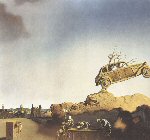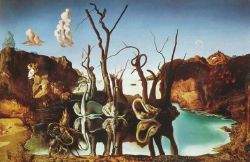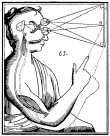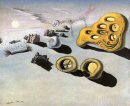 [en]
[en]
Nicholas Carr writes about technological time and space on Realtime kills real space and Real time is realtime. How does technology changes our perception of the territory?
I am buying a house in a village in the Appennines mountains with some land annexed. As it often happens in those mountain areas, the properties are broken up into small portions which reflect the complicated hereditary and family lines, where every single small piece of land has its own identity. The fields’ names vary: sometimes they refer to events which happened there, or to the characteristics of the territory, and there are funny and odd names as well.
Every field has its own personality through its name, its own history, its own micro-“genius loci,” which was known and experienced by the local population. But not anymore. The names and their locations in the territory are vague memories of some elderly people of the village. Google Earth will not be able to track down their names, but even in that case they would be like names on the tombstones, emptied of their souls.
During the last 50 years or so, the population of the village dropped from 200 to currently around 20. As with other places, the factor contributing most to the change in the territory has been road construction leading to the massive use of cars which came with industrialization. Roads have changed the geography of places, moved the places of residence and work, and forced many people to own cars. Individual means of transportation instead of collective ones have been privileged due to a series of economic reasons connected with the car industry.
Besides places, cars have also changed sociality in a massive manner, starting from removing children playing on the roads, to lack of public spaces for meeting, and development of big commercial centers which can be reached only by cars.
The massive transfer to cities and their suburbs during the last decades moved us away from an immediate and felt relationship with the territory, which is now mostly seen as a road from one place to another. At a certain point the ever-spreading use of mobile phones outdistanced us further from the territory, moving our attention to somewhere and someone else while we are staying in a certain place.
Al Gore’s father promoted the American highway system, and his son became one of the greatest promoters of information highways. As highways place everybody in car boxes, the Internet has placed us in front of a screen, mostly indoors at home or in an office. Even when we are on some territory we are connected while mobile through some gadget – again in front of a screen. When we drive along the road we get a digital representation of the territory through GPS systems, adding a further layer between the external space and our presence and attention in it.
[/en][it]
Nicholas Carr scrive sullo spazio e il tempo tecnologico a Realtime kills real space e Real time is realtime. Cosa cambia la tecnologia nella nostra percezione del territorio?
Sto acquistando una casa in un villaggio dell’alto appennino emiliano con dei terreni annessi. Come avviene spesso in quelle aree montane, il terreno di proprietà è diviso in piccole porzioni che riflettono le complicate linee ereditarie e famigliari, dove ogni singolo fazzoletto di terreno ha una sua identità. I nomi dei campi sono dei più vari: talvolta si riferiscono a fatti avvenuti nel luogo, oppure a caratteristiche del territorio, e vi sono anche nomi buffi e stravaganti.
Ogni campo tramite il suo nome ha la sua personalità, la sua storia, il suo micro “genius loci”, che era conosciuto e vissuto dalla popolazione locale. Ora non più. I nomi e la loro locazione nel territorio sono un vago ricordo di pochi vecchi del paese. Google Earth non ne potrà rintracciare i nomi e anche in qual caso sarebbero come nomi sulle lapidi, svuotate dalla loro anima.
Il paese è passato nei decenni da una popolazione di circa 200 persone a una ventina. Come per molti altri luoghi, il fattore che ha più contribuito a cambiare la vita del territorio è stato la costruzione delle strade e l’uso massiccio delle automobili che è andato di pari passo con l’industrializzazione. Le strade hanno cambiato la geografia dei luoghi, hanno spostato i luoghi di residenza e di lavoro e hanno costretto molti ad avere un’automobile. E’ stato privilegiato il trasporto individuale piuttosto che lo sviluppo del trasposto collettivo per una serie di interessi legati al mondo dell’automobile e di tutti i suoi annessi.
Oltre che i luoghi, le automobili hanno cambiato la socialità in modo massiccio, dal togliere i giochi dei bambini in strada, alla mancanza di spazi pubblici di incontro, allo sviluppo di grandi centri commerciali che possono essere visitati solo con un’automobile.
Il massiccio spostamento verso le città e le periferie dei decenni scorsi ci hanno allontanati da un rapporto immediato e vissuto con il territorio, che viene visto perlopiù come una strada per andare da un luogo all’altro. Ad un certo punto il massiccio uso dei cellulari ci ha distanziato ulteriormente dal territorio, spostando la nostra attenzione in un luogo “altro” verso qualcun altro mentre ci troviamo in un certo luogo.
Il padre di Al Gore promosse il sistema autostradale americano e il figlio è stato uno dei più grandi promotori delle autostrade dell’informazione. Così come le autostrada hanno posto tutti quanti nelle scatole delle automobili, Internet ci ha posto tutti quanti di fronte ad uno schermo, perlopiù all’interno di qualche casa o ufficio. Anche quando siamo all’esterno nel territorio siamo connessi in mobilità tramite qualche gadget, di nuovo di fronte ad uno schermo. Quando percorriamo una strada in automobile otteniamo una rappresentazione digitale del territorio attraverso i sistemi GPS, ponendo un ulteriore strato tra lo spazio esterno e la nostra presenza e attenzione ad esso.
[/it]
Leggi tutto “Cars, Bytes, and Territory”

 [en]
[en]



